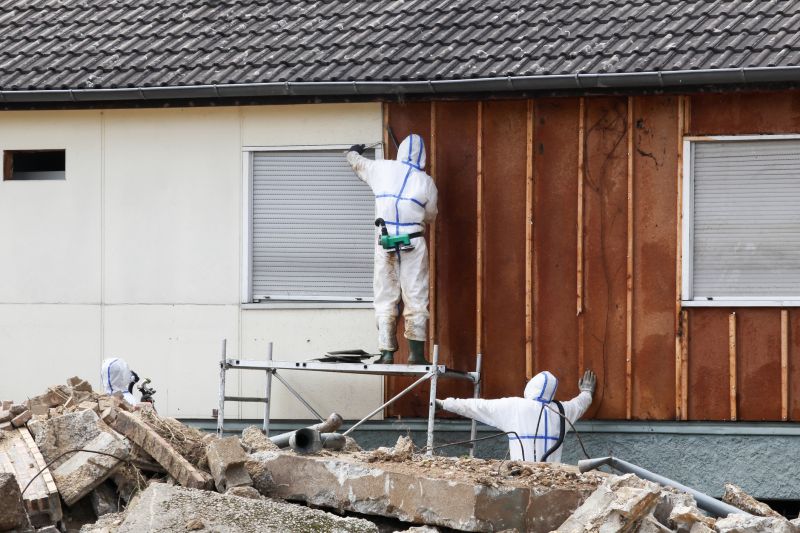Expert Picks For Asbestos Inspection Tools You Can Trust
Choose from top-rated inspection devices designed to help you identify asbestos risks with confidence and ease.
 Products for asbestos inspections encompass a wide range of tools and devices designed to identify the presence of asbestos-containing materials in buildings and structures. These products are essential for homeowners, contractors, and environmental professionals aiming to assess potential health risks associated with asbestos exposure. Typically, asbestos inspection tools include sampling kits, handheld detectors, and laboratory testing supplies, each serving a specific purpose in the inspection process.
Products for asbestos inspections encompass a wide range of tools and devices designed to identify the presence of asbestos-containing materials in buildings and structures. These products are essential for homeowners, contractors, and environmental professionals aiming to assess potential health risks associated with asbestos exposure. Typically, asbestos inspection tools include sampling kits, handheld detectors, and laboratory testing supplies, each serving a specific purpose in the inspection process.
Top Overall Option
Asbestos Sampling Kit
An asbestos sampling kit provides all necessary tools for collecting material samples safely and effectively. It typically includes sample containers, protective gloves, masks, and detailed instructions to ensure proper handling and documentation. This type of kit is suitable for both DIY inspections and professional assessments, offering a reliable way to gather samples for laboratory analysis. Using a comprehensive sampling kit can help facilitate accurate identification of asbestos in various building materials.
Types of Products For Asbestos Inspections
Handheld Asbestos Detectors
Portable devices designed to provide preliminary indications of asbestos presence, aiding quick assessments in the field.
Sampling Containers and Kits
Specialized containers and kits for collecting material samples safely for laboratory testing.
Magnifying Glasses and Loupes
Optical tools to assist in visual inspections of building materials for signs of asbestos-containing materials.
Protective Gear
Gloves, masks, and suits designed to protect inspectors during sampling and inspection activities.
Laboratory Testing Kits
Complete kits or protocols for sending samples to certified labs for asbestos analysis.
Infrared and Thermal Imaging Cameras
Advanced imaging tools that help detect hidden asbestos-containing materials through thermal signatures.
Air Quality Monitors
Devices that measure airborne asbestos fibers in indoor environments to assess contamination levels.
Fiber Counters and Air Sampling Pumps
Equipment used to collect air samples for fiber counting and analysis in suspected areas.
Visual Inspection Guides
Manuals and checklists to assist inspectors in identifying potential asbestos-containing materials visually.
DIY Asbestos Inspection Kits
All-in-one kits tailored for homeowners to conduct preliminary assessments before professional testing.
Popular Choices
Compact devices used for quick field assessments of suspected asbestos presence, commonly favored for their convenience.
Tools for collecting surface samples from building materials for laboratory analysis.
Bright, adjustable lights that help in detailed visual inspections of hard-to-see areas.
Devices used to collect airborne fibers for subsequent microscopic analysis.
Full-body suits designed to prevent fiber exposure during sampling activities.
Complete kits for packaging and sending samples to certified asbestos testing laboratories.
Tools that assist in detecting heat signatures associated with asbestos-containing materials behind surfaces.
Instruments measuring airborne asbestos fibers to evaluate contamination levels in indoor spaces.
Guides to systematically examine building components for signs of asbestos materials.
Affordable kits for homeowners to perform initial asbestos assessments before professional intervention.
Accurate detection often begins with visual assessment, where inspection kits equipped with magnifying glasses and sampling containers are used to collect material samples for laboratory analysis. Portable detection devices, such as handheld asbestos testers, can provide preliminary indications of asbestos presence, although they do not replace lab testing for definitive results. Laboratory analysis remains the most reliable method for confirming asbestos content, involving specialized testing kits and sample submission protocols.
When choosing products for asbestos inspections, it is important to consider the safety and ease of use of each tool. Proper protective gear, including gloves and masks, is crucial during sampling to avoid fiber exposure. Additionally, the quality and accuracy of sampling containers and testing kits can significantly influence inspection outcomes. Investing in reliable, well-reviewed products helps ensure precise identification and reduces the risk of overlooking asbestos hazards.
Overall, a comprehensive asbestos inspection approach combines visual assessment tools, sampling equipment, and laboratory testing supplies. This multi-step process supports informed decision-making regarding asbestos management, removal, or further investigation. Whether for a small residential project or a large-scale building assessment, selecting the right products is key to conducting thorough and safe inspections.
Key Buying Considerations
- Certification and quality assurance of testing kits and devices
- Ease of use and clarity of instructions for sampling and testing procedures
- Safety features included in protective gear to prevent fiber exposure
- Compatibility of sampling containers with laboratory analysis protocols
- Portability and durability of handheld detection devices
- Accuracy and sensitivity levels of detection equipment
- Availability of customer support and technical assistance
- Reputation and reviews of the product or brand
- Cost and value for the features offered
- Compatibility of products with existing inspection workflows
- Frequency of calibration or maintenance requirements
- Availability of comprehensive kits versus individual components
- Size and weight of portable devices for ease of handling
- Clear documentation and guidance provided with products
- Compatibility with certified asbestos laboratories for sample analysis
